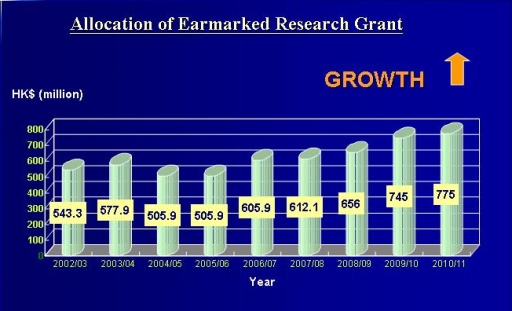
|
|
|
|
|
|
|
|
|
|
Innovation and research play a critical role in shaping the future of Hong Kong. Academics have a mission to discover new knowledge through research, develop the respective professional disciplines, apply them to the society, and nurture students for the benefit of Hong Kong. The University Grants Committee (UGC) provides two sources of funding for supporting the eight UGC-funded institutions to carry out academic research: Block Grants and Earmarked Research Grants. The research element of the block grants ensures that institutions acquire and enhance their research infrastructure. Earmarked Research Grants are allocated on a competitive basis to academics in the institutions for carrying out high quality research projects, through the peer review mechanism by Research Grants Council (RGC) under the UGC. RGC consists of Five Panels The RGC is a non-statutory funding body under the aegis of the UGC. Its members are appointed by the Chief Executive, and comprise local and overseas academics, and local community leaders. The RGC advises the Government through the UGC on the institutions’ needs on research matters, and reviews research proposals submitted by institutions for allocation of the research funding provided by the Government. In the 2009/10 academic year, the RGC allocated a total of HK$745 million through its various competitive funding schemes. The peer review mechanism is widely adopted by international research funding agencies – and the RGC is no exception. The RGC consists of five panels, comprising prominent local and overseas experts in various fields. In assessing each proposal for research grants, the panel members will engage several external reviewers to conduct the evaluation. RGC will consolidate the Panels' funding recommendations, and then make a final funding decision. Research and teaching are complementary to each other, and inextricably linked. Teaching staff in the institutions have to take part in research in order to transmit to their students cutting edge knowledge of their fields, and to inspire them to acquire new ideas by themselves. The funding allocated by the UGC to institutions for research purposes represents about 23% of the block grant, while 75% for teaching and the remaining 2% for other professional activities. The UGC thus not only supports the research mission, but also actively promote teaching and learning through research. Basic research, though not necessarily yielding readily tangible outcomes, does have far-reaching impacts that have broad applications not limited to local issues. In the evaluation process, the RGC accords equal treatment to different types of research projects, based on their academic merit, so as to create a research-oriented academic environment. There are commentaries saying that local academics prefer working on subjects of interest to the Western academia while neglecting local issues, in order to gain international recognition. However, it is true that the standards of scientific and technological research in Europe and the America are among the top internationally, it is understandable that local academics would like to strive for results in the same high standard. The RGC believes that there is no conflict between pursuing international academic excellence and addressing the needs of the local community. For example, research projects on the Economic and Business Strategy of Hong Kong, Control of Pandemic and Inter-Pandemic Influenza and the research studies in Liver Transplant, etc are unions of global significance and local relevance. Research in natural sciences and technology generally needs to procure special equipment and hire research assistants. Their need for more resources is self-evident. Comparatively speaking, what the research in humanities and social sciences needs most is the time of the researchers themselves. In view of this, the RGC has been allocating special funding through the General Research Fund for employing substitute teachers so that the researchers of these disciplines can free up more time to do the research and writing. In 2008, the Government’s Central Policy Unit launched the Strategic Public Policy Research Scheme, which particularly caters for the social scientists. Devote more resources to Academic Research As Hong Kong is achieving greater strengths in research, RGC believes that the quality of our research has reached the international high standard. To strive for more distinctive results, RGC agrees the need to devote more resources to academic research, and has recommended the Government to enhance its support in this regard. With the establishment of the Research Endowment Fund, the RGC can provide greater funding stability and certainty to support its various competitive research funding schemes. The Research Group under the UGC is now conducting two important reviews: one on how to improve the Research Assessment Exercise in future, and the other on how to enhance the competitiveness of research funding. These reviews will dovetail with the 2010 Higher Education Review, and will inform the 2012-15 triennium academic planning and funding allocation.
|
